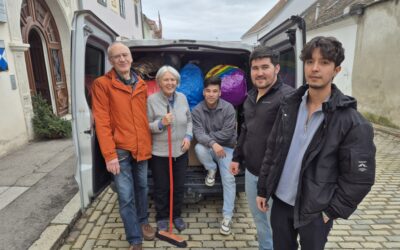Let’s take a look at some scenes that are typical of today’s world. …
We can observe … in countries that have experienced recent changes, people who are rejoicing in their newfound freedom. Alongside them are people who are fearful, disappointed and depressed because they have seen their ideals collapse. …
And what if we were to see scenes of racial strife with massacres and human rights violations … Or unending conflicts like those in the Middle East, with the destruction of homes, people wounded and dying and the continuous falling of deadly bombs or other lethal weapons? … … Let us ask ourselves again: what would Jesus say in the face of such tragedies? ‘I told you to love one another. Love one another as I have loved you’.
Yes, that is what he would say looking upon these and the most dire situations of the world today.
But his words are not merely regret for what has not been done. He really and truly is repeating them to us today. For he died, but he rose again and, as he promised, he is with us every day until the end of the world.
And what he says is of immense importance. Because this sentence ‘Love one another as I have loved you’ is the true key to solve of every problem. It is the fundamental answer to overcome every human evil. … …
Jesus defined the commandment of love as ‘mine’ and ‘new’. It is typically his, having given it a unique and very new content. He said, ‘Love one another, as I have loved you.’ And he gave his life for us.
Our life is therefore at stake if we love like this. And a love ready to give our life for our brothers and sisters/neighbours is what He is also asking of us
Friendship or kindness towards others is not enough for Him; neither is philanthropy nor solidarity alone. The kind of love He asks for is not limited to non-violence.
It is something active, very active. It asks us no longer to live for ourselves, but for others. And that requires sacrifice, effort. It asks everyone to become … like little daily “heroes” who, day after day, are at the service of their brothers and sisters/neighbours, ready to give even their lives for them. …
This mutual love among you will indeed produce fruits of infinite value, because where there is love, God is there and as Jesus said: ‘Where two or three are gathered in my name (that is, in his love), I am there among them’ …
Jesus himself will work with you in your countries, because in a certain way, he will return into the world, wherever you meet, and you will make him present by your mutual love, by your unity.
And he will enlighten you about all that needs to be done, he will guide you, he will support you, he will be your strength, your ardour, your joy. …
So, keep love among you and sow love in many corners of the earth among individuals, among groups, among nations, using every means, so that the invasion of love, which we often speak of, may become a reality, and so that the civilisation of love we are all longing for, may take root, thanks also to your contribution.
This is what you are called to do. And you will see great things happen.
Chiara Lubich
Photo © Archivio CSC Audiovisivi




0 Comments